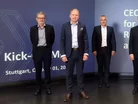Lean Manufacturing: What is the European CEO Alliance?

2, October 2020, Volkswagen AG, along with CEOs from 11 other European companies in technology, software, manufacturing, automotive, energy, telecommunication, mining and metals, joined forces to develop a ‘zero-carbon future’ and ‘a more resilient Europe’.
Representing multiple industries that combined generate US$710bn in annual revenue and employ 1.7mn people, all members of the Alliance support the Paris 2050 goals, the EU Green Deal and the ambition to raise EU climate targets, channelling their collective decarbonisation efforts.
“The climate targets of the European Union are feasible. Our industries do not block, but rather foster the shift toward a carbon-neutral economy. We see growth potential for all industries in the long run. If we manage this historic transformation successfully, sustainable development and new future-proof jobs will be the result. Together, we will support all efforts to reach a social consensus for more sustainability,” said the Alliance.
Tackling Climate Change Requires Strong Collaboration Between the Public Sector and Industry
Believing that reducing emissions by 55% by 2030 is achievable, the Alliance members have already pledged to invest over US$118bn in their respective decarbonisation roadmaps. In order to reach their targets, each member and sector is dependent on others, which will call for cross-sector activities.
“Climate change will remain our greatest challenge over the next years and decades. The Alliance fully supports the EU Commission’s climate goals, to which there is no alternative. Now it’s time to shift the political discussions towards getting it done. In an unprecedented move, the Alliance with its industry-leading companies from across Europe calls for a carbon pricing signal covering all emissions across industries and countries,” said Dr. Herbert Diess, CEO, Volkswagen Group.
Furthering Efforts to Reduce Greenhouse Gas Emissions by 55% in 2030 and Achieve Carbon Neutrality by 2050
As a single driving force, the Alliance members recently identified four key focus areas for industries to reduce greenhouse gas emissions and achieve carbon neutrality.
- A strong carbon price signal: the alliance believes that carbon should have a pierce across the whole economy, calling for a continued enhancement of the EU Emissions Trading System (for power and heavy industry) and the implementation of sector-specific cap-and-trade systems for mobility, transportation and buildings sector. Another proposal included measures to simultaneously achieve a social balance and emissions reduction.
- Decarbonising mobility, transport and buildings: in the transport and mobility sector, electric mobility is proving to be the most efficient technology when it comes to energy consumption and emissions reduction. In order to foster the entire ecosystem, the Alliance has initiated cross-sectoral projects to ramp up battery production and create a charging infrastructure.
- EU Commission’s buildings renovation wave: supporting ambitious renovation targets to accelerate the transformation of the building stock, the Alliance identified that buildings should meet higher standards regarding energy efficiency, renewables and sustainable materials. The Alliance is also calling for fossil-fuel heating systems to be rapidly replaced.
- The rapid build-up of renewable power generation and electrification: the Alliance is working on a project to integrate power systems, to create a system based on predominantly renewables and flexible solutions.
“As the European Commission prepares to present its “Fit for 55” energy and climate package with measures to reduce greenhouse gas emissions by 55% in 2030 and achieve carbon neutrality in 2050, the mobilization of industrial and economic players will be essential to achieving our climate objectives together. "said Clément Beaune, Secretary of State for European Affairs in the French government.
Participating companies and their respiective CEOs: Björn Rosengren (ABB), Thierry Vanlancker (AkzoNobel), Francesco Starace (ENEL), Leonhard Birnbaum (E.ON), Börje Ekholm (Ericsson), Henrik Henriksson (H2GreenSteel), Ignacio Galán (Iberdrola), Frans van Houten (Philips), Christian Klein (SAP), Christian Levin (Scania), Jean-Pascale Tricoire (Schneider Electric) and Herbert Diess (Volkswagen).
McKinsey & Company is also serving as a knowledge contributor and providing additional research and data.
- The University Manufacturing Circuit Boards from LeavesSustainability & ESG
- Schneider Electric's Commitment to Sustainable ManufacturingSustainability & ESG
- Lenovo & Saudi Alat Building Green Manufacturing FacilitySustainability & ESG
- Nissan Brings Biodiversity to the Factory through RewildingSustainability & ESG


